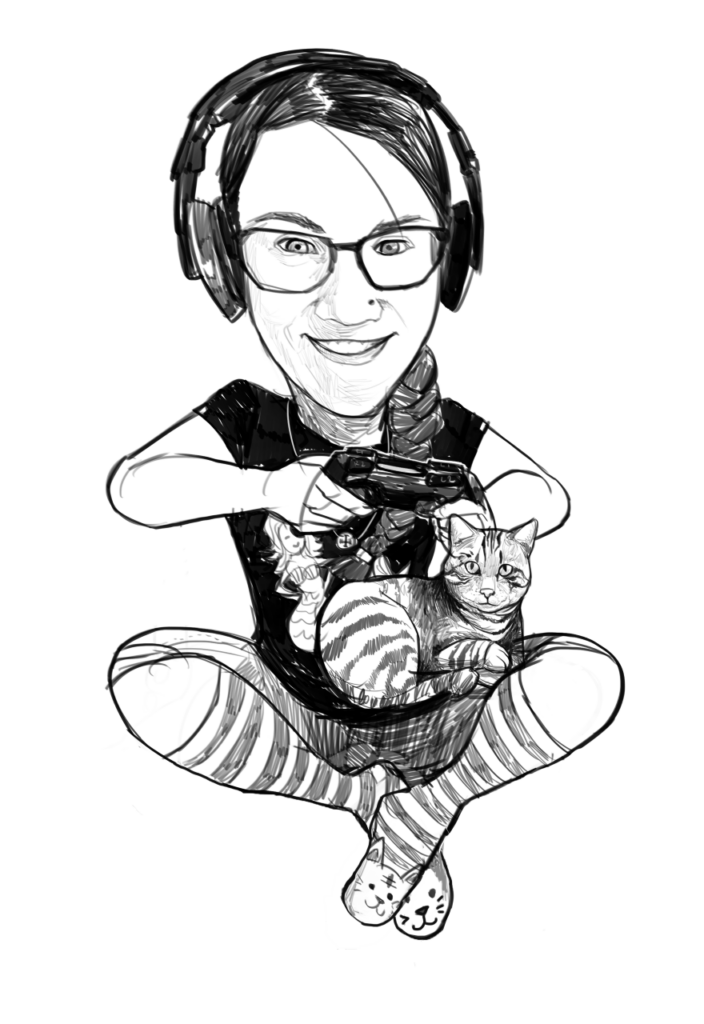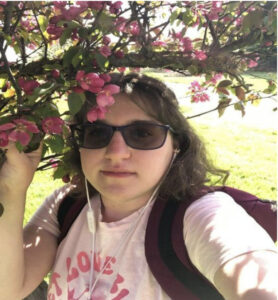A disputed theory works for Zach, who has autism
By Chris Martin, Unrestricted Interest
I hear the familiar Skype jingle and accept the call. Zach’s pixilated face comes into focus and I see Larysa, his devoted and talented facilitator, next to him. His fingers are busy with colorful beads, like the kind worn at Mardi Gras, and he diligently wraps them around his left hand. Zach is classically autistic and non-verbal. His inability to speak arises from the sensorimotor challenges of autism, which tax his body in unseen ways. But 23-year-old Zach is also wonderfully expressive; whether it’s the sly smile that occasionally emerges from within his half-scowl of concentration, or the poems he writes when he, Larysa and I meet up on Skype once a week.
The term “autism” was wrongly coined to explain how people like Zach are essentially alone, always submerged in some insular, unknowable world. But young men like Zach are often surrounded by incredible collaborators, people who help them encounter the demands of a complex world built without them in mind. While many people on the autism spectrum struggle with appropriate social functioning, some of the most challenged find themselves involved in rich, deeply mutual relationships that allow them to communicate who they are and who they would like to be, Zach included.
Today Zach and I (and Larysa) are writing a poem about the word “great.” This poem also doubles as an elegy. Last week Zach’s brother, who Zach thought was great, tragically died, and in trying to process this “great” loss he’s found writing to be helpful. We begin by looking up the word “great” in a thesaurus and use the pool of synonyms as source material for our poem. Working together on a shared document, I fill in the beginning of each line and Zach, with Larysa’s help, completes it, typing one assisted letter at a time. She supports his elbow and forearm with her hands, organizing his chaotic motor world into linguistic focus. Larysa, who is a bit intimidated by poetry, is one of several facilitators who works with Zach in a given day.
I use the phrase “I think” as the beginning of the first three lines:

I think my Daddy is great
I think my brother is awesome
I think my mind is prodigious
One characteristic of autism is a tendency to repeat phrases or dwell on particular topics. In diagnostic terms it’s called “perseveration.” In poetry, however, when you begin several lines with the same phrase you’re using a poetic device called “anaphora.” What the world reads as a defect becomes a sophisticated tool within the formal confines of a poem.
Zach begins this poem with a characteristic trope in his work: his love for his father. The second line seems to continue in the same vein, but given Zach’s recent loss I feel the dark side of awe nesting inside awesome. When Zach chooses “prodigious” to describe his mind in the third line I nearly burst with delight. The word choice itself, among all the other possible synonyms for “great” he might have chosen, demonstrates its truth. Zach’s mind is prodigious, especially when you realize that in another era (or even this one, if he didn’t have such dedicated parents and access to critical resources) he might have been thought incapable of communication. A prodigious mind is definitively not a “low-functioning” one.
For the next four lines, I shift our anaphora to “I know”:

I know my love is extravagant
I know my brother passing is terrible
I know that winter is crazy
I know you are happy
Zach’s love is extravagant. He writes about his love often and its frequency never diminishes how the loved ones in his life feel when they are bathed in its glow. He knows that his love makes a difference. In the history of autism, this certainty has been at stake in the very definition of whether an autistic person is worthy of care, of services, and, most crucially, of reciprocal love. All people with autism are different, but it would be nothing less than transformative if the world could recognize how very present, how fully grounded, love’s concept is for many on the spectrum.
The fifth line speaks for itself. It is the place where some terrific force grows terrible, where great love becomes great loss. It’s enough to make one feel crazy, a feeling embodied by winter in its swirling and grave cacophony. And yet there’s something inherently humorous about this sixth line. Both Larysa and I laugh and Zach’s smile emerges for a moment.

And with this acknowledgement of how grief can lead to laughter, to release, the poem shifts back. Larysa then asks Zach how he knows I am happy. He writes:
Because your smile is bright.
That becomes our eighth line. Zach, despite his difficulty reading social cues and body language, has done exactly that; he’s used my face to decode my emotions.
These eight lines, on their own, would be enough to make most of us reconsider what a young man with classical autism can understand and express, if not who he fundamentally is — but the ninth line is why I can’t stop thinking about this particular poem and the circumstances of its composition.
Facilitated communication, the kind of motor intervention used by Larysa to help Zach type, has been denounced in forums like Slate and the New York Times Magazine as inauthentic, or worse, as a dangerous hoax. While there have indeed been incidents where facilitated communication has been practiced in bad faith, it has also been deeply and genuinely life changing for many people without recourse to verbal expression. Without the intervention of assisted typing, Zach would never have been able to communicate any wish or desire in linguistic terms, much less write a poem. I believe this blog post by poet and professor (and father) Ralph James Savarese manages to strike a judicious balance between condemnation and blind adherence.
In all cases of facilitated communication there exists a symbiotic relationship of language and expression between the writer and the facilitator. To my mind, that’s the very nature of collaboration, and a bonus when it comes to improving the abilities of someone diagnosed with profound social deficits. But there are also moments when it’s completely clear that the autistic writer’s particular idiosyncrasies are surfacing on the page, unaided by the facilitator. This was the case with line nine:
I think my Daddy is billowing
As you might imagine, “billowing” is nowhere to be found on our list of synonyms for “great.” In fact, as the word began to materialize, Larysa stopped Zach and had him start over. Sometimes when Zach loses focus he types at random and to her the word emerging just then didn’t make any sense. And to be fair, in the everyday world of conversation, billowing doesn’t really show up unless you’re hanging laundry or standing on the deck of a sailboat. Again he began typing the word and again Larysa erased it and refocused him. But when he returned to the same pattern of letters, I wanted to see where it was going. Zach finished the word and I sat with it for a moment, taking in the full sensory experience of that word in all its willful and unexpected strangeness.
That’s when it hit me. My eyes involuntarily started to well up. Zach’s dad, in the throes of an incalculable grief, was billowing. Carved hollow by the tragedy of a lost child, the wind of grief was passing through him, turning his entire being into a rending tremble.
Recent studies have shown that autistic writers filter language largely through the sensory processing regions of their brains. Because of this unique wiring, the writing of people with autism escapes much of the vague abstraction that often plagues amateur (and even professional) poetry. It connects directly with a felt experience of the world.
The truth is I’m not sure I’ve ever heard a more sensory-charged statement of how grief feels. The emotional acuity of Zach’s line staggers me every time I think about it.
Zach has a thing about the number 10. He likes to count to it over and over again, feeling the wave of numbers rise in excitement to meet that double digit. As such, we often end our poems at the 10th line, and this poem was no exception. I changed our focus one last time and began the line with the words “I imagine,” which Zach completed in his ever-hopeful way.
I imagine god’s place is lovely
***
Chris Martin works with Zach and others with autism teaching creative tools in the art of writing poetry. He is the co-founder of Unrestricted Interest. Author of The Falling Down Dance. Poet and professor. Father and feminist. Editor and advocate.
“Unrestricted Interest is a writing program and consultancy dedicated to transforming the lives of kids and adult on the autism spectrum through poetry. Our teaching-writers work one-on-one with student-writers to explore their passions and forge pathways to a richer life on and off the page. We also write and install creative writing curricula tailored to the needs of specific schools, programs, and institutions. Unrestricted Interest is devoted to twin missions, interrelated and mutual. One is to serve the autism community by increasing quality of life, quality of expression, and opportunities for advocacy. The other is to create meaningful, fulfilling, and sustaining work for poets outside of academia.”
Header art work: Julian Arsi, other art work by Max, James, and Sophia in Sunday Circle art class facilitated by Keri Bowers.
The Art of Autism is posting blogs on poetry and art for our 2017 Art of Autism Poems and Art for Peace project leading up to World Peace Day – September 21, 2017. If you have a poem or art submit to Keri Bowers – keri@normalfilms.com.








